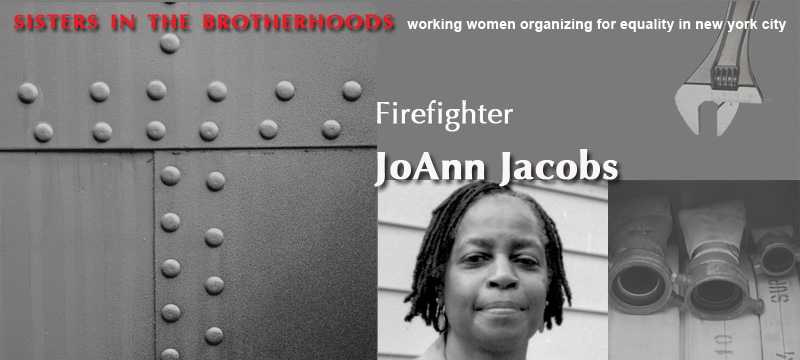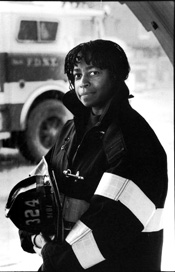 |
||||||
|
||||||
|
Born in Brooklyn, JoAnn Jacobs graduated from York College with a degree in sociology and then took a job working nights at a children's shelter. A friend who worked at Northwest Airlines told Jacobs about openings in its baggage-handling department. When Jacobs joined the airlines, she became the first woman to be hired as a Northwest baggage handler at JFK Airport and also tripled her salary. She remained with Northwest for four years. At that point she wanted to join the police department, but that goal was stymied by a hiring freeze. Then she learned about openings in the New York City Fire Department (FDNY) through the Vulcan Society, a fraternal organization for African-American firefighters. Jacobs sought the Vulcans' help in preparing for the physical test and also benefited from their support in other ways. The society assigned each African-American woman a mentor who was an officer. Jacobs passed the written test in 1977 and took the physical test in 1978, all while continuing to work for Northwest. She received a letter about the class action suit initiated by Brenda Berkman and agreed to join the suit. Looking back on her training, Jacobs recalls that she felt physically prepared for the FDNY Fire Academy because she was accustomed to physical labor. What made the experience stressful were the various ways in which the department held women back, including an arbitrary system of deficiency slips. In 1982 she was one of 11 women graduates of the Fire Academy and the first African-American woman to enter the FDNY. Jacobs' first assignment was fortuitous. She went to Engine Company 324 in Corona, Queens, a well-run firehouse under the leadership of Captain George Donnelly. Other women were not as fortunate. To aid them, Berkman founded United Women Firefighters (UWF), an organization that provided support and advice. Divisions eventually arose within UWF. Racism and harassment were major problems for some women, while others found acceptance on the job. Some women developed coping mechanisms that isolated them from their peers. Jacobs joined UWF and served as its president during 1987╨1988. Despite internal conflicts, UWF endured and provided young women welcome assistance as they launched a career with the FDNY. Jacobs achieved a high degree of success during her 20-year career in the FDNY. She remained with the same company for much of that time. In 1990 the FDNY hired firefighters to be its official recruiters and asked Jacobs to be part of that effort. She served as a recruiter until the unit was disbanded and then decided to study for the Fire Marshal test. For a year she attended a study group sponsored by the Vulcan Society. She passed the exam, and her promotion came through in 1992, becoming the second woman to become a New York City fire marshal. After her first year as a fire marshal she was assigned to the Juvenile Fire Setter Program. She received the City of New York Sloan Public Service Award (1995) for her outstanding work with that unit. Toward the end of her career she failed the hearing test and was placed on light duty. She worked in the department's EEO unit briefly but left because ironically this unit included an individual who was, in her words. "a major harasser." She moved to FDNY's medical unit. She retired in November 2000 after what she calls "20 of the best years of my life." In her interview Jacobs discusses the barriers that women encountered at the Fire Academy and the strategies she developed for coping with on-the-job challenges. |
|||||
| ||||||
Copyright 2012 Jane LaTour/Talking History |
||||||
